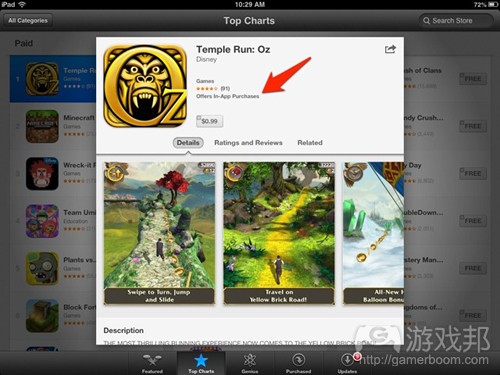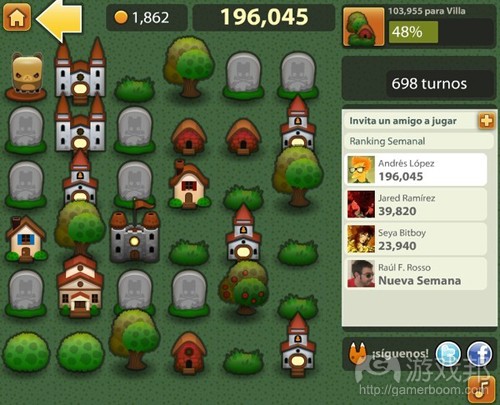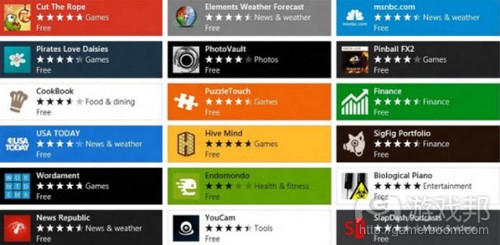每日观察:关注Spry Fox称单人游戏不具盈利性(3.26)
1)据pocketgamer报道,因不少家长投诉苹果监管不力,导致儿童误买IAP内容,苹果最近已在App Store列表中添加了IAP警告提示。
现在凡是含有IAP内容的付费和免费应用均会呈现这一警告信息,桌面版和iOS版App Store都会出现“含应用内置付费功能”(Offers In-App Purchases)这一信息。
2)据gamasutra报道,华纳兄弟互动娱乐最近在旧金山成立一家新工作室,将致力于开发免费移动和网页游戏。
该工作室将由华纳兄弟现任数字游戏高级副总裁Greg Ballard主导,此外还将负责监管华纳兄弟互动娱乐所有移动游戏的发行工作。
3)据venturebeat报道,韩国移动游戏公司Com2Us市值已从2012年翻倍增长至5亿美元以上,联合创始人Jiyoung Park(在大学时代创办这家公司)现在是韩国史上最著名的女性CEO之一。
该公司向韩国移动通信网络Kakao Talk发布了5款游戏,并向日本同类平台Line推出了2款游戏。Park表示,他们在自己的平台上需要6个月才能让游戏日活跃用户增长至100万,但在Kakao Talk平台只需要两个月。
Kakao Talk目前的顶级游戏在韩国市场日常收益达100万至200万美元,该平台用户达5000万。今年1月份有5款Kakao游戏进入Google Play收益榜单前10名(不过这些游戏并没有全部跻身游戏下载量榜单前10名)。
Park于1998年成立Com2Us(当时是WAP手机盛行的年代,那时她还是在校大学生),该公司于2007年上市,并于2008年12月发布首款智能手机游戏,目前已有500多名员工,在韩国、日本和中国都有工作室。公司游戏目前月活跃用户为3500万,其中包括300万注册用户。
4)据pocketgamer报道,Spry Fox首席执行官David Edery最近在旧金山的游戏开发者大会(GDC)上表示,“《Triple Town》是一款单人游戏,它实际上并没有人们所想象的那么成功,原因就在于它不是多人游戏。
Edery指出,也正因为如此,Spry Fox将来不会再着眼于开发单人游戏,多人游戏才是开发商的盈利来源。《Triple Town》的收益算不上纪功,平均每名玩家收益介于4-6美元,它在移动平台的表现优于Facebook,但仍不算是巨大的成功。
他表玩家在这款单人游戏中的乐趣来自不花钱就能发挥出色表现,只有多人游戏才能促使玩家花钱——因为人们喜欢向他人炫耀自己的物品或技能。所以在《Triple Town》这种单人游戏中出售更美观的物品并没有什么意义。
5)据insidesocialgames报道,HTML5平台服务供应商Ludei日前宣布将添加3D支持,允许开发者向多数智能手机和平板电脑发布WebGL 3D游戏。
Ludei将使用开放式的WebGL标准、JavaScript API和其他与OpenGL相当的浏览器(运用于AAA级主机和PC游戏)来支持3D游戏;开发者可使用Ludei的技术向Google Play、App Store跨平台发布3D游戏。
6)据MetroStore Scaner报道,微软Windows Store问世5个月应用数量已超过5万(游戏邦注:iOS活跃应用数量已超过82万1438款),这表明该平台已经得到了不少开发者的支持,并且也显示其整个生态系统处于健康发展状态。
(本文为游戏邦/gamerboom.com编译,拒绝任何不保留版权的转载,如需转载请联系:游戏邦)
1)Apple adds in-app purchase warnings to App Store listings
by James Nouch
Apple has added in-app purchase warnings to App Store listings, following a spate of stories in which children amassed mighty in-app purchase bills for their unwitting parents.
The warning is displayed alongside paid and free apps that contain in-app purchases. It is present on both the desktop and iOS version of the App Store and simply reads: “Offers In-App Purchases.”
This change follows hot on the heels of a settlement in the US courts that forced Apple to propose a refund system for in-app purchases. The scheme, if implemented, will compensate the parents of children who make in-app purchases of over $30 without acquiring consent.
The warning doesn’t just appear for freemium titles – it’s shown beside paid apps too.
The buck stops
Although in-app purchases certainly aren’t new, a flurry of mainstream media interest has put pressure on Apple to make changes.
Media reports have uncovered instances in which children racked up bills as high as £1,700 in games that their parents believed were completely free – prompting much debate over who should take responsibility for such cases. (source:pocketgamer)
2)Warner Bros. forms new mobile game studio in San Francisco
By Mike Rose
Newsbrief: Warner Bros. Interactive has formed a new studio in San Francisco, which it says will focus on developing free-to-play mobile and browser-based games.
WB Games San Francisco will be led by Greg Ballard, Warner Bros.’s current senior vice president of digital games, and aims to take advantage of the social and mobile buzz in the Bay Area.
The new studio will also oversee publishing of all other mobile games developed by Warner Bros. Interactive, and will be located in the same offices as social movie website Flixster. (source:gamasutra)
3)Com2Us rides the Kakao mobile games wave and expands to the U.S.
Dean Takahashi
Com2Us is one of those companies that doesn’t come to mind when you think about games. But the Korean mobile game company doubled its market value in 2012 to more than $500 million, and it’s successfully expanding into other markets, including the U.S.
In South Korea, Com2Us has hit celebrity status. Jiyoung Park [above], who cofounded the mobile game company while she was a student in college, is one of the best known female CEOs in
Korean history. And the company is starting to benefit from games that are available on fast-growing mobile messaging networks such as Kakao Talk in South Korea. Com2Us has five games on
Kakao, and they have become the company’s biggest titles. It also has two titles on Japan’s similar Line service.
“On our own platform, it took us five to six months to grow a game to 1 million daily active users,” Park said in an interview with GamesBeat. “On Kakao, it takes only two weeks to one month to get to a million users. The market is really changing.”
The top games on Kakao Talk (particularly on Android) are generating $1 million to $2 million a day in revenue, just in the Korean market alone, and that’s why 95 percent of the revenue on
Google Play in Korea now comes from games. Japan’s Line and China’s We Chat are also taking off. The question is whether this new craze for mobile games is limited to Asia, or it could
take off here too. If it does, then game developers will have a powerful way to get their games discovered. That’s a huge problem in an age of app stores with hundreds of thousands of
competing titles.
Park said that the growth of Kakao Talk reminds her of the growth of Cyworld, which preceded Facebook as a major social network. Such networks are a great way for game developers to get more users, as friend recommendations are trusted and a great way to spread word of mouth about a game. But Facebook discovered that users hate getting too much spam from games, and it moved to limit it on its platform. That slowed the growth of games, but it gave piece of mind to Facebook’s non-gamers. Kakao and Line may run into the same thing, but Kakao already limits the number of game invites.
Multiple game companies are benefiting from Kakao’s growth, which reaches about 50 million people. That’s not a huge number, but it is a very active market. In January, five Kakao titles
were in the top 10 revenue generators on Google Play, even though not all of those titles is ranked in the top 10 games in terms of downloads. The games are light, with a lot of gifting
that introduces new players to the games. The popularity of these games is making the cost of acquiring users lower. But the content is curated, so that it isn’t available to every game maker, Park said. In Japan, the market is dominated by “battle card” games, like GungH0 Entertainment’s Puzzle & Dragons. NHN’s Line dominates there, but DeNA and Gree are setting up competing services.
One of the keys to the growth is that the mobile messenger services access your contacts, which are people that you know. It contacts them without using expensive text messages. By contrast, the U.S. doesn’t have a dominant messenger service here. The closest equivalent might be logging into Facebook on your iPhone.
The mobile messenger games are the latest craze for Com2Us, but this company is not a flash in the pan. Park started the firm in 1998 (with college friends) in the days of WAP phones, and the company went public in 2007. It launched its first smartphone games in December, 2008. It has 500 employees, including six in the U.S. It has offices in Korea, Japan, and China. Com2Us has more than 60 games on the market, and it is launching a graphics-heavy golf game in the U.S. The games generate 35 million monthly active users for Com2Us, including three million subscribers.
Park realizes that the Korean market is small on the global stage. While Koreans spend money, they will hit limits at some point. So that’s why it is important for Com2Us to grow in the
U.S. market and figure out how to get people to behave the same way in the here.
“We want people to play more games in the U.S.,” said Don Lim, general manager for Com2Us in the U.S. “It is a crucial market here. The cultural backgrounds are different, but we will make games from the bottom up to be suitable for the market here.”
One of the keys is upping the quality on 3D graphics for recent titles on golf and snowboarding. That means it is taking more upfront investment to make games, but the titles are still making use of freemium models such as free-to-play with virtual goods sales. Right now, all game development takes place in Korea, but U.S.-born developers are making contributions to the
games. One of Com2Us’s tower defense games hit No. 2 for top-paid titles in the U.S. In the U.S., Park said her company will launch 20 games this year. Over time, Com2Us will publish more games made by other developers.
Overall, Park’s ambition is to make the company more relevant on the global stage of gaming.(source:venturebeat)
4)#GDC 2013: Triple Town not the ‘massive success’ people think it is, admits Spry Fox
by Keith Andrew
“Triple Town was a single player game,” said Spry Fox’s CEO David Edery during the studio’s guide to making an original free-to-play game at the Game Developers Conference in San Francisco.
“That should have been our first red flag.”
Triple Town may have amassed a loyal and far-from-small following since launch, but according to Spry Fox, it isn’t the “massive, massive success” people frequently think it is.
The main reason? It’s not a multiplayer game.
No-go solo
That’s why, Edery revealed, that it’s unlikely Spry Fox will focus on developing a single player game in the near future.
Multiplayer, he claimed, is where it’s at if you’re looking to make money.
“A lot of people have made the assumption that Triple Town is some massive, massive success,” said Edery candidly.
“It’s not – it does okay. Our revenue rates tend to top out at $4-$6 per person. It does better on mobile than Facebook, but it’s not a massive hit.”
Triple Town
Edery claimed that it’s “so, so hard to make money from single player games”, with the studio “hitting a wall” every time it tried to add a feature to Triple Town that players would be willing to part with cash for.
“People zone out in single player games – why would they spend money to improve their performance? The joy of the game comes from doing better without spending money,” he added.
“The games people spend money in are multiplayer – people like to show off to their friends. We sell things in Triple Town that makes the game prettier, but who cares? No one else ever sees it.”
Early focus
That’s not to say that Spry Fox hasn’t learned from its Triple Town experience, of course.
One important tip developers should take on board, Edery added, is not to get too wrapped up in using an in-house engine or spending time and money on things that will add polish later on.
A developer’s first priority, he said, should be ensuring that the core mechanic behind whatever game florishes works and is fun.
“Don’t spend too much on some flash tech that may pay off later on – your first priority is working out if the core mechanic works, so use something simple and easy like Unity just to get going,” he added.
“It doesn’t take using a hand crafted engine that took 10-12 months to make to create a game people love.”
Another tip? Try not to listen too much to what your customers say. Instead, focus on what they actually do.
Gaming gripes
“If you just react to what your players say all the time, you could get yourself in a lot of trouble,” said Edery.
“What they say is just what’s in their head at the time. However, users griping on forums is almost always a good signal – it almost always tells you something is wrong. But the solutions they come up with don’t tend to work.”
Besides, if you’ve got the core mechanic of the game right at the start, it’s far easier to right any wrongs later on.
“The hardest thing with F2P games is finding the one core mechanic that you can explore and make fresh for years on end,” added CCO Daniel Cook.
“What you need is a continent of play space. With one of our early prototype games, we made the mistake of playing around endlessly with tiny bit of land we’d made, and not exploring the wider continent of fun.”(source:pocketgamer)
5)Ludei adds 3D support to its HTML5 platform
Emanuel Maiberg
HTML5 platform provider Ludei today announced it’s adding 3D support to its game development platform, allowing developers to deliver WebGL 3D games to most smartphones and tablets.
Ludei’s platform will support 3D games using the open WebGL standard, a JavaScript API and the browser equivalent of OpenGL, used in triple-A console and PC games.
“Our 3D rendering allows today’s most popular mobile devices to run a 3D HTML5 game with the same great user experience and performance that native gamers are used to.” Ludei CEO Eneko Knorr said.
Developers can use Ludei’s technology to deliver their 3D titles cross-platform to Google Play, the Apple App Store and more. Developers interested in using Ludei’s new 3D technology can
get started here.
Ludei is showing off its new product at GDC 2013 in San Francisco. We’ll have more on it on Wednesday when the show floor opens.
We last heard from Ludei when it announced the Ludei Cloud Compiler, which allows developers to build games and web apps as HTML5-based projects and then turn them into native apps that can be easily distributed to the Apple App Store and Google Play.(source:insidesocialgames)
6)Windows Store passes 50,000 apps
Dean Takahashi
After five months on the market, Microsoft’s Windows Store has surpassed 50,000 apps, according to MetroStore Scanner. The number of apps available is an indication of developer support, and it shows that the overall ecosystem is in a healthy state.
If you remember when the Apple iTunes App Store surpassed 50,000, the mark generated a lot of excitement about the platform’s viability. Now, iOS has more than 821,438 active apps available. Of course, it would be nice to know how many of the Microsoft apps have actual downloads. Apple’s downloads have surpassed 10 billion.
Still, Microsoft is on its way to offering a third viable choice to Apple and the Google Play store. The timing of the milestone is nice, as Microsoft will be among the many companies pitching 23,000 attendees at next week’s Game Developers Conference in San Francisco.(source:venturebeat)
下一篇:分享混合题材的游戏UI设计方法













































